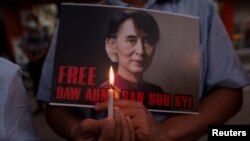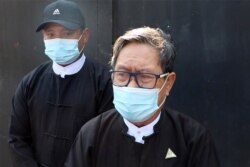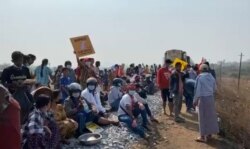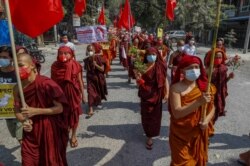Myanmar authorities filed a second charge Tuesday against deposed leader Aung San Suu Kyi, an apparent legal maneuver that could keep her detained indefinitely.
Suu Kyi’s lawyer told reporters in the capital of Naypyitaw after meeting with a judge that she was charged with violating the country’s COVID-19 containment restrictions.
Suu Kyi, under house arrest at her official residence in Naypyitaw since this month’s military coup, was previously charged with illegally possessing imported walkie-talkie radios without a license. Violating the law is punishable by a maximum of three years in prison.
President U Win Myint is also under house arrest.
In an interview with VOA’s Burmese Service, the ousted leaders’ attorney, U Khin Maung Zaw, said the country’s 2008 constitution prohibits the president from being charged with criminal offenses, rendering the charges against him unlawful and invalid.
Maung Zaw also said the latest charge against Suu Kyi is politically motivated and aimed at keeping her under house arrest.
The new charge against Suu Kyi comes as the military intensifies its crackdown after overthrowing the elected civilian government on Feb. 1.
Nationwide protests continued Tuesday despite a shutdown of the Internet for a second consecutive night.
Protesters blocked off the street in front of the country’s central bank in Yangon, despite an increasing presence of military vehicles on the street the day before. Reuters says protesters also blocked train services between Yangon and the southern city of Mawlamyine. Dozens of Buddhist monks took part in Tuesday’s protests marches in Yangon.
Clashes between protesters and Myanmar police have been escalating since the military detained de facto leader Aung San Suu Kyi and other high-ranking officials of the civilian government on February 1 and declared a one-year state of emergency, citing widespread fraud in last November’s general elections, won by Suu Kyi’s National League for Democracy in a landslide. The military’s claims were rejected by Myanmar’s electoral commission.
Senior Gen. Min Aung Hlaing, who led the coup, promised last week in a nationally televised speech that new elections would be held to bring what he called a "true and disciplined democracy,” but he did not specify when they would take place.
Tens of thousands of demonstrators have filled the streets of Myanmar’s biggest cities in defiance of a strict curfew and a ban on gatherings of more than four people, holding signs filed with pro-democracy slogans, many of them with pictures of Suu Kyi. They’ve raised a three-finger salute as they marched, a sign of resistance against tyranny as depicted in the popular “Hunger Games” movies.
In addition to protests, government employees and civil servants are on strike, resulting in disruption of train services throughout the country, also known as Burma. The military has ordered civil servants back to work and threatened action against them. A growing number of workers from other sectors, including medical personnel, have walked off their jobs in recent days.
Security forces have grown increasingly aggressive against the protesters, firing warning shots, rubber bullets and water cannons in an effort to disperse them.
Protesters Sunday at a power plant in the northern state of Kachin were met with gunfire by security forces. Videos from the protest show members of the military firing into crowds to disperse them, but it was not clear whether the bullets were rubber or live ammunition.
Troops and military vehicles were out in force Monday in an increased security presence in major cities.
In Mandalay, troops used rubber bullets and catapults to break up demonstrations in front of the Myanmar Economic Bank. Local media reported that a few people were injured.
The United Nations said Special Envoy to Myanmar Schraner Burgener spoke Monday morning with Myanmar Deputy Commander in Chief Soe Win to again press for a visit to the country under agreeable conditions.
In a joint statement, ambassadors to Myanmar from the United States, Canada and 12 European Union nations also denounced the military’s interruption of communications and expressed their support for the people of Myanmar, saying “the world is watching.”
VOA Burmese Service contributed to this story








